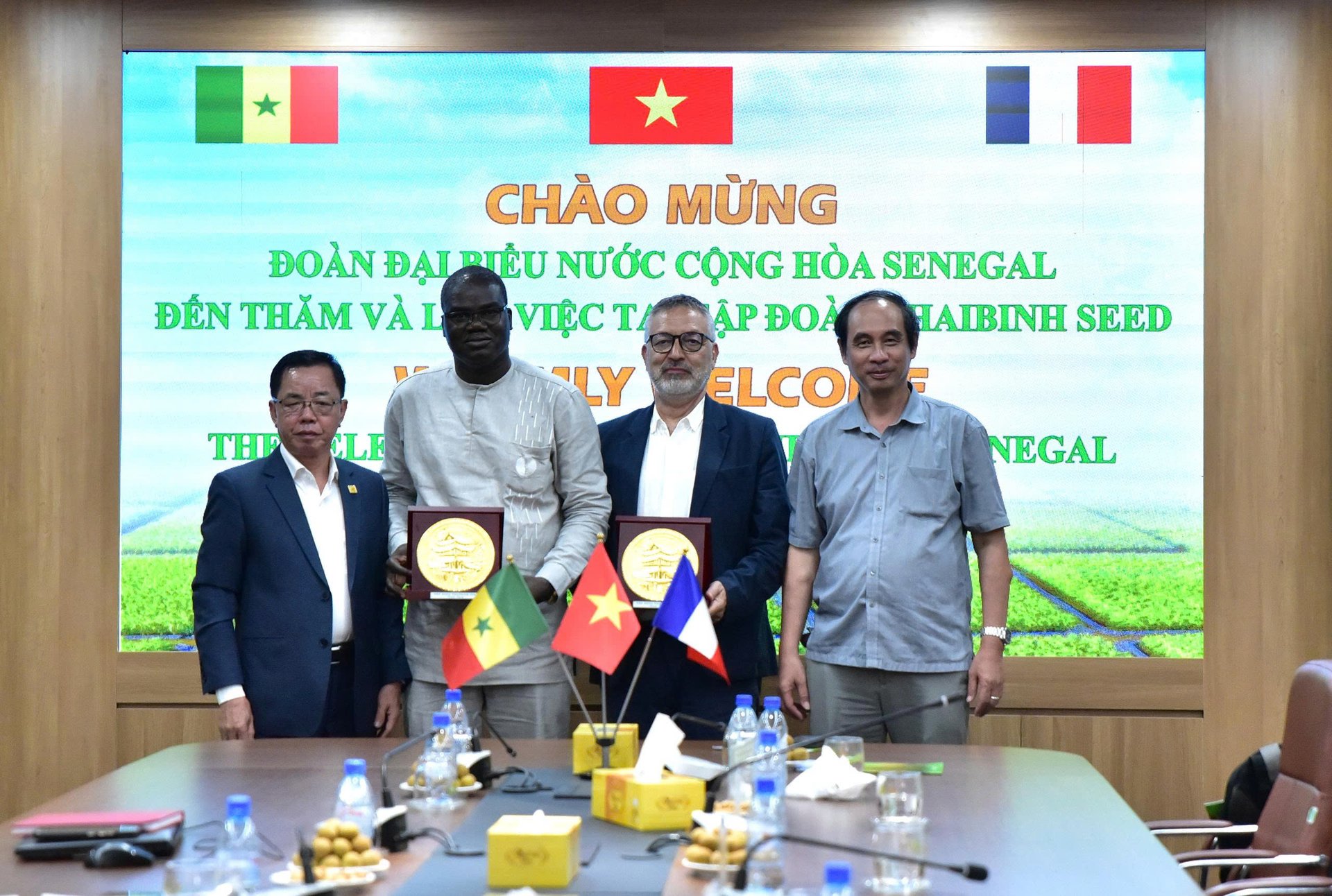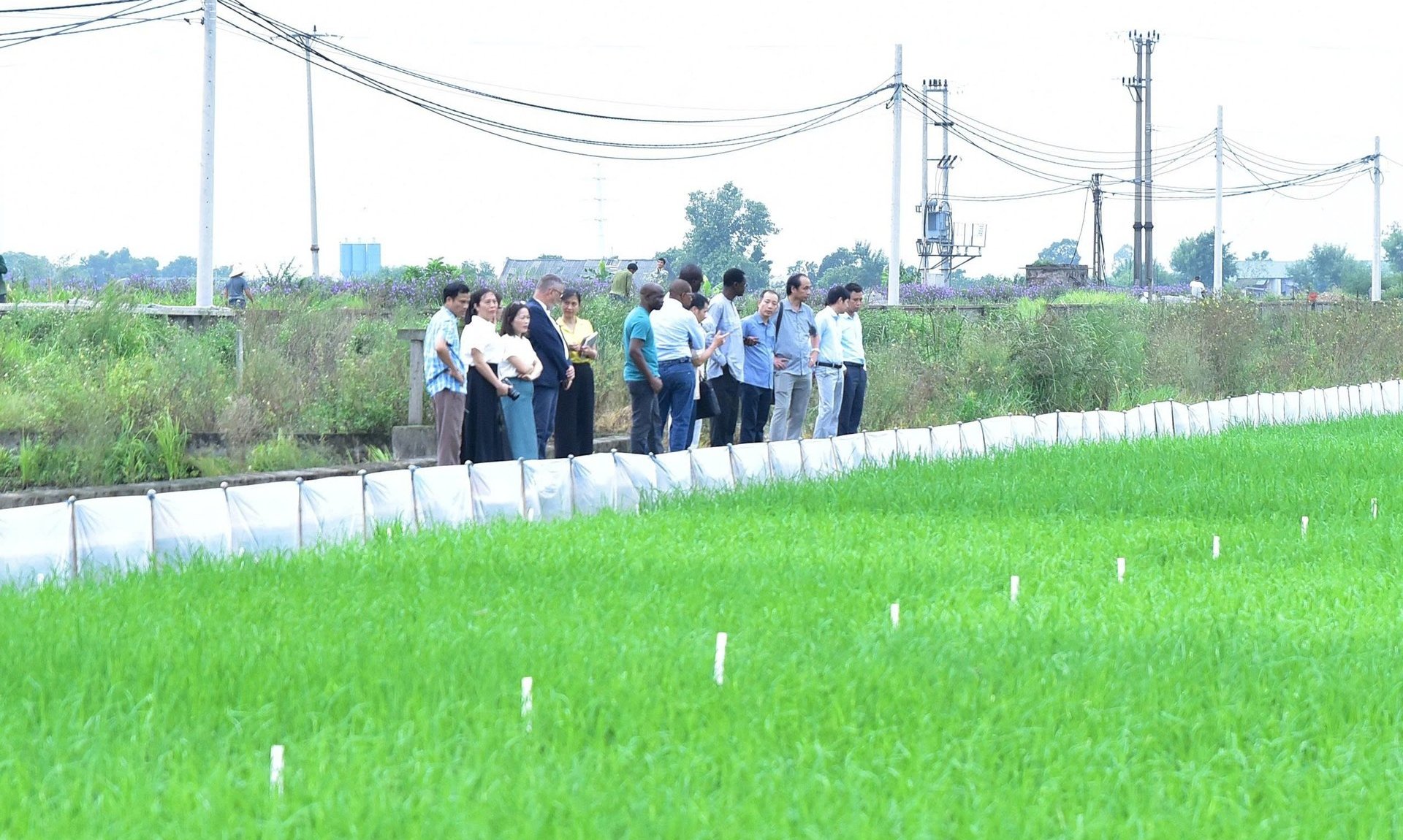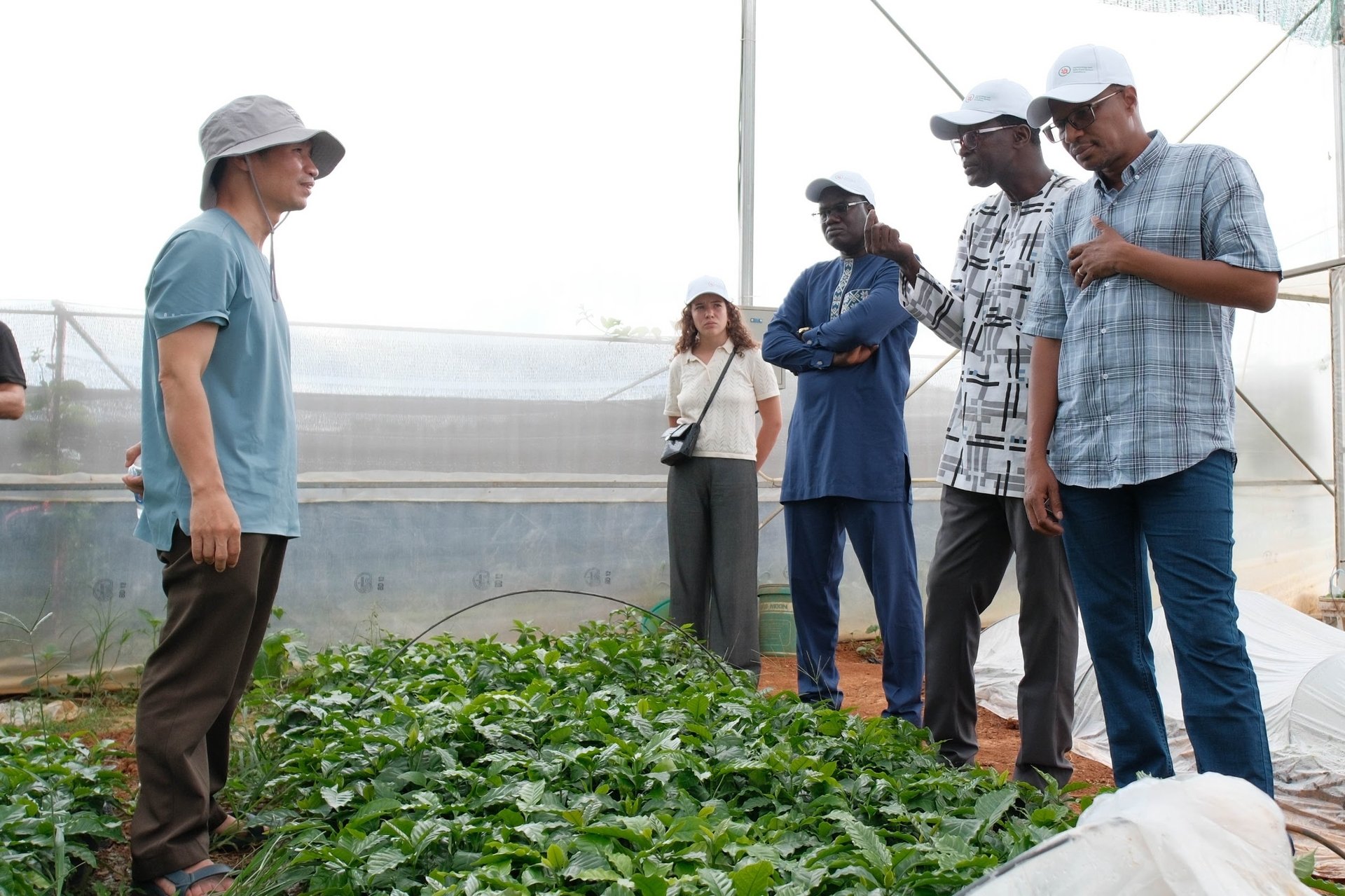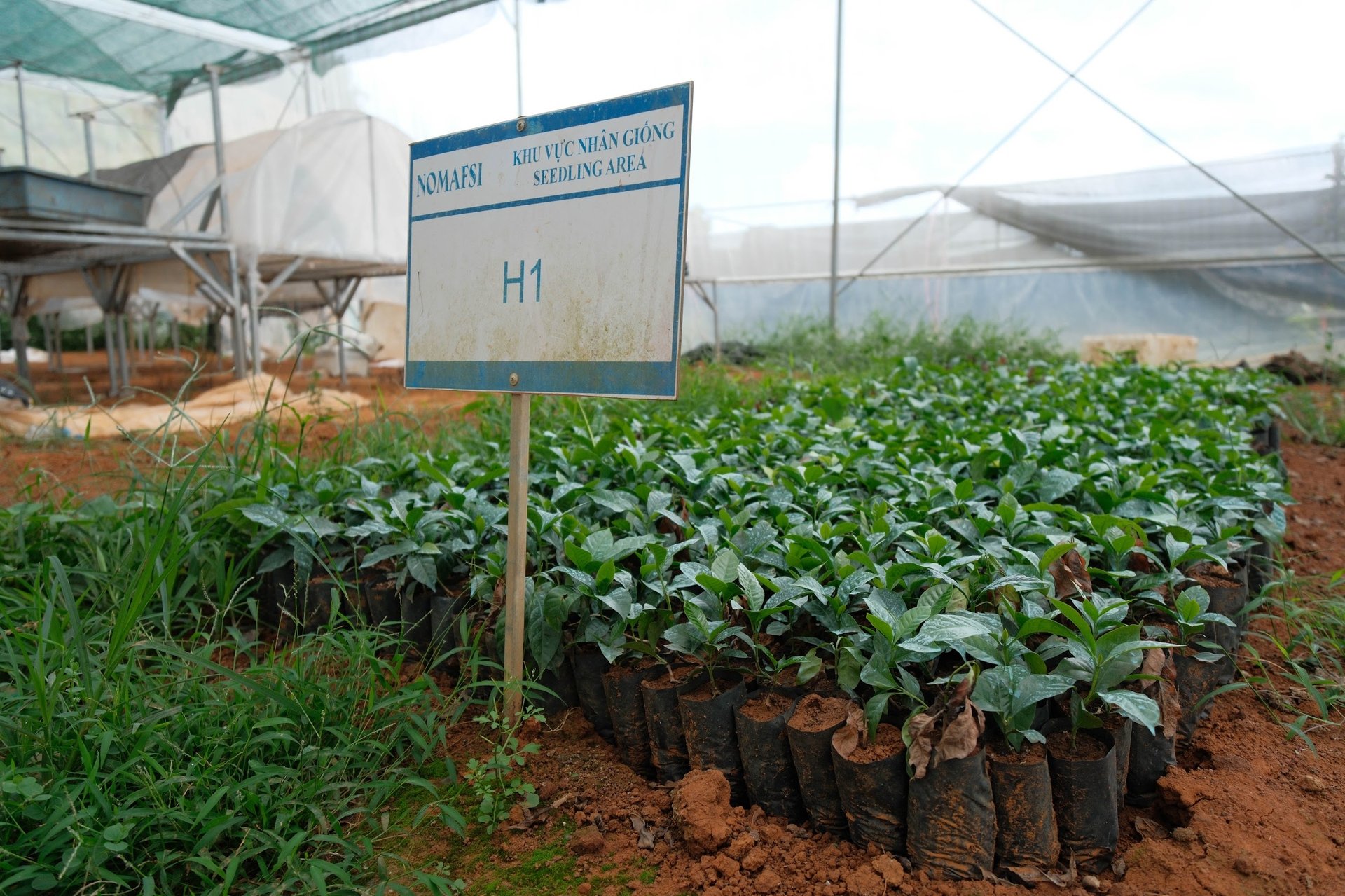December 30, 2025 | 19:11 GMT +7
December 30, 2025 | 19:11 GMT +7
Hotline: 0913.378.918
December 30, 2025 | 19:11 GMT +7
Hotline: 0913.378.918
Over its 80-year journey, Vietnam's agricultural sector has faced numerous challenges but also achieved significant milestones. It has progressed from ensuring food for over 100 million people to solidifying its role in bolstering global food security. As Vietnam entered a period of reform and integration, it chose international cooperation as a driving force for agricultural development. Within this framework, South-South cooperation has been a crucial journey, built on principles of shared progress and development.

Vietnamese and Senegalese scientists taking for a group photo. Photo: Kieu Chi.
According to Le Van Minh, former Director of the International Cooperation Department at the Ministry of Agriculture and Rural Development (MARD), the ministry was assigned to participate in the South-South cooperation program as early as 1996. At that time, with support from the Food and Agriculture Organization of the United Nations (FAO), tripartite agricultural cooperation launched a food security program with countries including Senegal, Ghana, Madagascar, the Republic of Congo, and Guinea-Conakry.
Beyond that, Vietnam expanded to four-party cooperation with France and the FAO, implementing numerous projects in Tanzania, Namibia, Mozambique, Gambia, and Gabon. These projects created a solid foundation for Vietnam to gradually affirm its position as a reliable partner in international cooperation programs.
"Through cooperation, each country can leverage its own strengths to support one another. This not only benefits each nation but also contributes to the common development of humanity, particularly in ensuring food security," Minh remarked.
Over two decades, Vietnam has consistently demonstrated its perspective on developing ecological agriculture, modernizing rural areas, and building a civilized farming community, all while protecting the environment during the country's push for industrialization and modernization. These major policies have inspired the international community and built Vietnam's image as a friendly and responsible partner on global issues.
On January 24, 2025, the Politburo issued Resolution No. 59 on international integration in the new context. This is one of four cornerstone resolutions as the country enters a new era of development. On May 30, 2025, the government issued Resolution 153 on the action program to implement Resolution 59, which tasked the Ministry of Agriculture and Environment with developing key plans, including: a strategic orientation for South-South cooperation in agriculture and rural areas, a strategy for attracting and managing foreign direct investment (FDI) in agriculture and rural areas, and a strategy for attracting, managing, and utilizing ODA and other preferential loans from donors and international non-governmental organizations.

A photo shows Senegalese agricultural scientists visiting a field at the Institute of Food Crops and Food Plants. Photo: Kieu Chi.
The Vietnamese government has affirmed a strong shift in its foreign policy vision: moving from a stage of "attracting resources" to proactively sharing and contributing to global issues. Over two decades of South-South cooperation, Vietnam has now made significant contributions, enhancing the nation's reputation on the international stage. Many African countries have expressed their appreciation for Vietnam’s support.
Recently, the Fostering Exchange of Agro-ecological Experiences Project (FEF-R), funded by the French Ministry for Europe and Foreign Affairs and coordinated by CIRAD—the French Agricultural Research Centre for International Development—opened a new chapter for scientific cooperation in improving production and helping communities adapt to climate change.
In August 2025, a delegation of leading Senegalese agricultural scientists visited Son La province within the framework of the CIRAD-coordinated FEF-R project.

A photo shows a delegation of Senegalese agricultural scientists visiting Son La province in August 2025 as part of the CIRAD-coordinated FEF-R project. Photo: Quynh Chi.
CIRAD has a long tradition of cooperation with the Vietnam Academy of Agricultural Sciences (VAAS) on programs concerning rice, coffee, and ecological agriculture. In Senegal, the organization also works closely with the Senegalese Institute of Agricultural Research (ISRA). This dual presence allows CIRAD to be a strategic bridge, supporting the development of agro-ecological solutions for common challenges.
The Senegalese scientists toured agro-ecological models, personally observing experiments in composting, granular organic fertilizer production, intercropping coffee with shade trees, and high-yield hybrid rice combined with beans and cassia to protect the soil. A representative from ISRA stated, "These are valuable experiences that Senegal can learn from and apply for sustainable rice production, adapted to climate change."
In addition to sharing production techniques, Vietnam and Senegal also exchanged insights on public policy and the role of the private sector. In Vietnam, many state-run research institutes have mobilized non-budgetary resources to participate in seed production, processing, and product commercialization. This is a clear testament to the socialization of agricultural research, helping to increase autonomy and reduce reliance on aid—a topic of particular interest to Senegal.
Both Vietnam and Senegal are heavily impacted by climate change, facing drought, saltwater intrusion, and land degradation. Agro-ecological initiatives are becoming a key for both countries to find shared solutions.

A photo shows the Senegalese delegation learning how to select crop varieties suited to the climate and ecology of the Northern mountainous region. Photo: Quynh Chi.
According to experts, the strength of the tripartite cooperation between Vietnam, Senegal, and France lies in its clear framework, which combines political commitment and a scientific foundation. The recent visit to Senegal by the Chairman of Vietnam's National Assembly further reinforced political trust, creating new momentum for agricultural cooperation.
Moving forward, the FEF-R project will continue to implement scientific exchange activities. In three months, the CIRAD expert group is expected to publish a policy brief to serve as a basis for building a long-term cooperation framework. Further, the tripartite cooperation could expand to many other areas beyond rice, such as livestock, fisheries, and vegetables.
Sharing with the Agriculture and Environment newspaper, François Roger, a CIRAD representative, affirmed, "Thanks to the partnership between the French and Vietnamese governments, combined with the ongoing activities in Senegal, we can build tangible results”.
Beyond Africa, Vietnam also collaborates with many international organizations to support Cuba and Venezuela in rice cultivation and rural development. Simultaneously, the agricultural sector partners with non-governmental organizations, implementing up to 299 rural development projects. Although not large in scale, these projects make practical contributions to improving livelihoods and enhancing the lives of people.
South-South cooperation, tripartite and four-party cooperation, along with the support of development organizations like the FAO, IFAD, and CIRAD, are opening up a new vision: building sustainable, ecological agriculture to ensure global food security.
Vietnam has now become a reliable partner, accompanying many other nations on the path to ensuring global food security. South-South cooperation is no longer just an international initiative; it is a symbol of the spirit of sharing and mutual development. With its new foreign policy vision, Vietnam is gradually affirming its role as a "global food security creator", contributing to a more sustainable and equitable world.
Translated by Linh Linh
/2025/12/29/0829-2-000508_274.jpg)
(VAN) Hai Phong is tightening management, with 100% of fishing vessels licensed and equipped with vessel monitoring systems, joining the national effort to lift the EC's 'yellow card.'
/2025/12/27/2744-1-121716_241.jpg)
(VAN) The Viet Nam Environment Protection Fund is the national environment protection fund and a state financial institution under the Ministry of Agriculture and Environment.
/2025/12/27/2015-2-111213_813.jpg)
(VAN) In efforts to realize the goal of Net Zero emissions, reducing urban emissions is regarded as a key solution.

(VAN) Deputy Prime Minister Tran Hong Ha requested to design the EPR mechanism toward a circular economy that is transparent, feasible, and non-administrative and aligned with actual recycling capacity.

(VAN) On December 24, Deputy Prime Minister Tran Hong Ha chaired a meeting about approving greenhouse gas emission quotas for 2025 - 2026 period.

(VAN) As Viet Nam enters a new era, the national agricultural sector must proactively adapt to global trends to transform current challenges into strategic development opportunities.
/2025/12/18/5046-3-154320_307.jpg)
(VAN) Granting planting area codes is a solution that helps Lao Cai manage forests effectively while also laying a data foundation to support the development of the carbon credit market in the future.